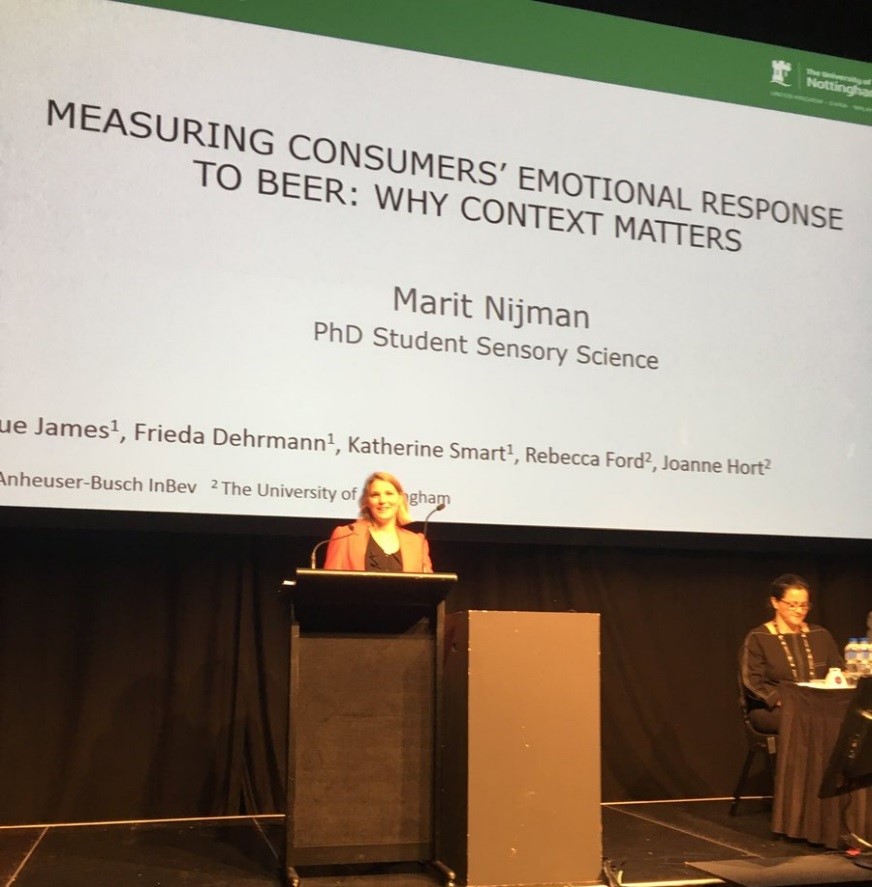I am very thankful to IFST for awarding me with the IFST Travel Bursary which contributed towards my travel costs to present my research at the 35th Asia Pacific Institute of Brewing and Distilling (IBD) Convention, March 2018.
The Asia Pacific IBD Convention is one of the main international conferences in the brewing industry and this year it took place in Wellington, which is known as the craft beer capital of New Zealand. The theme for the convention was ‘Explore the past to Discover our Future’, which represents the aim of the IBD to share past experience and knowledge on beer and brewing to enhance future developments in the industry. The four-day programme included 50 papers and 23 posters covering a range of topics relevant to craft brewing, large scale brewing operations and distilling. Industry suppliers and manufacturers manned around 50 trade booths. The social programme allowed for productive networking, allowing me to make new contacts whist visiting a number of different venues in Wellington to sample local food and beer. I was especially delighted to meet up with Prof. Joanne Hort, who supervised my PhD at the University of Nottingham before becoming the Fonterra Riddet Chair in Consumer and Sensory Science at Massey University in New Zealand.
IBD to share past experience and knowledge on beer and brewing to enhance future developments in the industry. The four-day programme included 50 papers and 23 posters covering a range of topics relevant to craft brewing, large scale brewing operations and distilling. Industry suppliers and manufacturers manned around 50 trade booths. The social programme allowed for productive networking, allowing me to make new contacts whist visiting a number of different venues in Wellington to sample local food and beer. I was especially delighted to meet up with Prof. Joanne Hort, who supervised my PhD at the University of Nottingham before becoming the Fonterra Riddet Chair in Consumer and Sensory Science at Massey University in New Zealand.
At the convention, all the latest developments in the brewing industry were showcased such as the use of wooden casks to create interesting new flavour profiles, innovative dry-hopping techniques and even that Virtual Reality is now being used to train brewing staff. Prof David Cook (University of Nottingham, UK) gave an excellent talk on the flavour impact of roasted malt products and showed some very interesting sensory data. I was also excited to hear my colleague Dr David Jenkins (University of Nottingham, UK) present his research on the influence of yeast on the oxidative stability of beer. A highlight for me was the talk by Prof. Gary Pickering (Brock University in Canada) on how Thermal Taster status can influence the perception and preference of beer and cider products.
The title of my talk was ‘Measuring Consumers’ Emotional Response to Beer: Why Context Matters’. My PhD project is sponsored by Anheuser-Busch InBev and the University of Nottingham, supervised by Dr Rebecca Ford. My research investigates how context impacts consumers’ emotional response to beer products, facilitating improved methodology for sensory consumer research. Measuring consumers’ emotional response to beer products has gained a lot of interest in the field of sensory science and in the brewing industry in recent years. My research has shown that the context in which a beer is served and tested has an influence on consumers’ emotional response, as well as hedonic preference and choice behaviour. Interestingly, my research found that tasting different beers in a bar resulted in a significantly higher liking for a lager beer than an ale, while the two beers were equally liked when tasted by the same consumers in a sensory laboratory. Furthermore, discrimination between the two beers based on emotional response was stronger in a bar compared to a sensory laboratory setting.
My research also discovered three consumer clusters who differed in their beer preference and their sensitivity to the beer drinking context. Two of the clusters showed a stable preference regardless of where the beers were tasted. However, the third, and largest consumer cluster was very sensitive to context showing a significant preference for a lager beer in the bar in terms of liking, positive emotional response and choice behaviour. In the sensory laboratory however, this cluster did not differentiate between the lager and the ale on liking, emotional response or choice behaviour. This research shows that test environment has a notable impact on the response of a large proportion of consumers which significantly impacted the overall results. Furthermore, measuring emotional response explained why preference and choice behaviour differed between consumer segments. These findings demonstrate that measuring emotional response provides information beyond overall liking and raise questions regarding the use of controlled environments for consumer testing. I was pleasantly surprised that there was a lot of interest in sensory research amongst the people I met at the IBD convention and this helped me gain a better understanding of the impact of my research and the wider impact of what sensory science means for the brewing industry. This convention also provided me with further insight into the job opportunities that might be out there for me after I finish my PhD.
The overall experience was very valuable to me, as well as enjoyable. Attending the Asia Pacific IBD Convention allowed me to immerse myself in the brewing industry, expand my professional network and present my work at an international brewing convention for the first time. I would like to thank IFST for awarding me the travel prize that allowed me to attend this convention.
Marit Nijman, PhD Student Sensory Science, University of Nottingham
